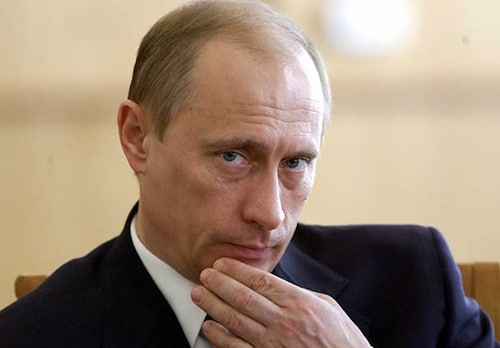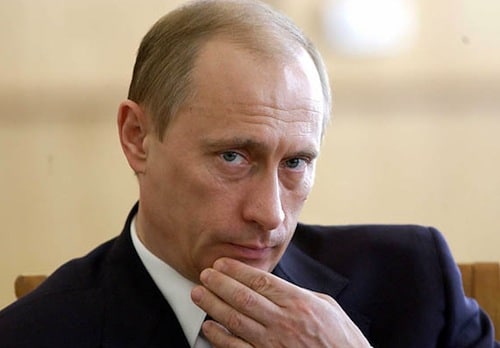It seems that Putin is about to invade the Baltics. Again.
With journalists and commentators distracted by Syria and Europe’s refugee crisis, Putin’s enduring desire to dash Westwards across the continent “recreating the Soviet Union” was seemingly put on the media’s back burner for a while. In fact, journalists had been oddly quiet on the subject of the Baltic states and a potential Russian invasion for months.
A piece published by the Financial Times last July admitted that the “consensus” among diplomats and analysts was that Putin had “not embarked on a rampage” to recreate an empire “as some feared last year”.
Given that new-found consensus, one might have suspected that the lull in stories about a forthcoming invasion could be chalked up to journalists deciding to put the subject to rest — but one would have been wrong. For they were back last week with a vengeance.
Interesting timing
On February 2, the Pentagon announced it would seek to quadruple its budget for Europe in 2017 to deter “Russian aggression”. On February 3, the UK’s BBC aired a fictitious ‘war gaming’ account of a Russian invasion of Latvia, complete with a nuclear strike on a Royal Navy warship and a planned strike on London — an exercise which one expert termed “psychological warfare”. On the same day, an American think tank, the RAND Corporation — which is partly funded by the US Department of Defense — claimed that Russia would be able to “overrun” the Baltics in 60 hours.
In the weeks leading up to the new media blitz, the Atlantic Council — whose primary founding aim is to defend NATO interests — had gotten the ball rolling again with a piece about Putin’s “next potential target” — which, you guessed it, was the Baltics. The piece was then re-published by Newsweek with the headline: “Counting down to a Russian invasion of the Baltics”.
This happens every time the Pentagon wants more money to play with. Various “studies” about the danger posed by whichever bad guy is in fashion start appearing. Experts suddenly realize that the US military is drastically underfunded in said area of immediate strategic importance. Officials begin making even more outlandish statements than usual. And the media eat it up, apparently completely unaware of the fact that they are being taken for a ride.
Helping hands
Once a theme has been set in motion like this, the venom spreads fast. And the accusations become more and more absurd. The Pentagon had a helping hand from op-ed writers near and far last week. Paul Goble was back with his trusty Hitler comparison in a piece which inexplicably tried to compare the support Hitler received from Germans during World War II to the support Putin enjoys among the Russian public today. The implication again is that it’s only a matter of time before the Russian president begins his Westward march.
Not wanting to neglect Russia’s wrongdoings in Syria, one op-ed in the Guardian did its utmost to place blame for all escalations in the crisis at Putin’s doorstep, contending that his policies have brought “chaos” and will force Europe to pay an “increasing price”. Readers were left with the impression that Russia had attempted a “strategic weakening” of Europe (presumably to allow the “revisionist” power to sneakishly invade the Baltics?) and that Syria would be a picture of democratic peace had Moscow not intervened in the crisis last September.
Nowhere was there any mention of the strategic interests of the US, UK or Saudi Arabia. Nor was there any acknowledgement that perhaps the chaos Europe finds itself facing was the result of more than Russian involvement in Syria. Although, we ought not to have expected much else from the same author that brought us: “Europe is in crisis, once more America will have to step in to save us”.
Stockholm syndrome, anyone?
Another Guardian op-ed argued that the BBC must “do more” to “counter” Russian propaganda — as if the BBC isn’t already currently engaged in its most vicious anti-Russia campaign in years. “Putin must be stopped,” the op-ed writer wrote, calling for a ratcheting up of economic sanctions and arming Ukraine. But the best moment came when he wrote that the British government could even “chip in” some extra funding for the BBC “without compromising” the channel’s independence. He never explains how this would not compromise its independence, he just states it. I wonder how he feels about Russian state-funded TV?
Then, he ends in the most patronizing way of all; in the style of the do-gooder who selflessly wants to help those poor Russians in need of some Western truth. “If ever there were people in need of accurate, fair, balanced information,” he writes, it is Russians and Ukrainians. Remember, this is the same writer that a few paragraphs earlier suggested escalating economic warfare on the poor Russians he apparently cares about so deeply.
Anyway, one wonders exactly what more the BBC could be doing to help “stop” Russia that it is not doing already. Bar running a documentary about how Putin probably/may have/definitely kidnapped Madeleine McCann, complete with reenactments and interviews with Pussy Riot, I’d say they’re doing pretty well on that front.
Baltic Invasion, coming to a theater near you
All of the above dramatizations and over-the-top statements make you wonder a little bit about the human condition. Two things we know about people are 1: They like to be outraged about something, and 2: They don’t like to be bored. This is a recipe for op-ed disaster.
Just think about it. A Baltic invasion would keep the moral police on the editorial boards of the New York Times and Washington Post going for months, if not years. It would be exciting, wouldn’t it?
Another war they egged on, but could now pretend they were devastated over. Some more bloody color for their front pages. Another information war to tweet about all day; maps with red circles and “proof” of Russia’s military misdeeds from some “expert” on his couch thousands of miles away.
With absolutely zero evidence to back up the idea that Putin would be stupid enough to wake up one day and randomly invade the European Union, it’s almost like they’re trying to will it to happen just for a bit of entertainment.
Rational, balanced voices sidelined
Meanwhile, saner, expert voices calling for rational thinking rarely get heard, and when they do, they appear as a mere footnote to the drama. Take Kent University Professor Richard Sakwa’s letter to the Guardian last week, in which he called for a calmer assessment of Russia and argued that its constant “demonisation” would serve to make no one safer.
“We need to understand more and condemn less,” he wrote, arguing that the country’s portrayal as an aggressive power only increases its own perception of threat from outside. He warned that such portrayals “fail to take into account its defensive posture”.
Understand more and condemn less. That’s not really very catchy, is it? It doesn’t involve the phrase “dangerous psychopath” so it’s a bit bland, really. No one’s going to click on that. We’ll just stick it over here in the “Letters” section that no one reads and forget about it.
Reprinted with permission from RT.


